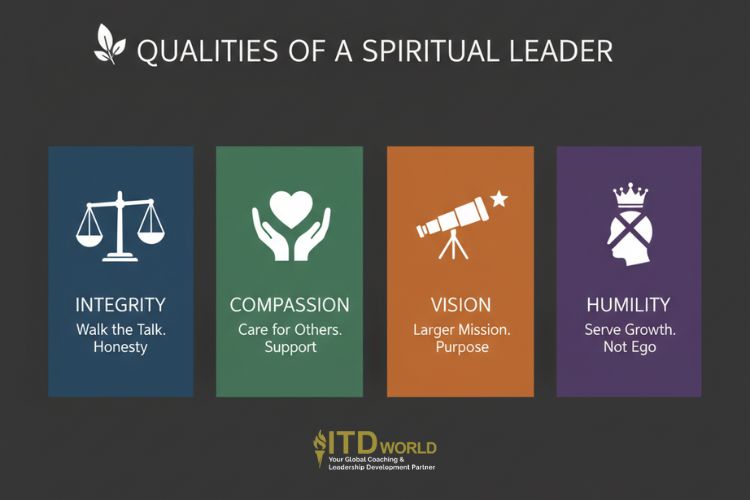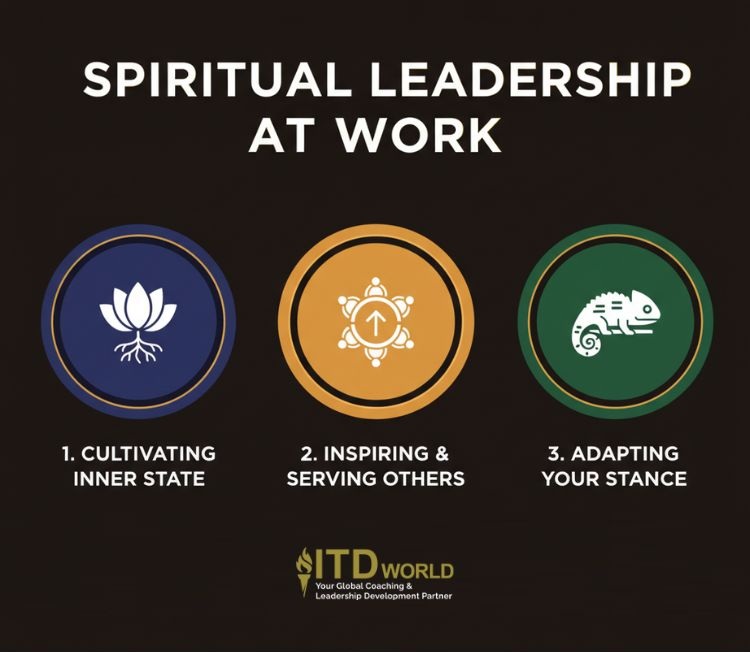A practical guide to understanding spiritual leadership and practicing this breakthrough, forward-thinking management style.
Leadership philosophy is constantly evolving to meet the demands of the time. Just as the industrial age’s “command-and-control” style gave way to the information age’s more empathetic approaches, a new evolution is taking place to meet the needs of the modern workforce. This next frontier is spiritual leadership – a universal, non-religious philosophy that addresses humanity’s deepest needs for purpose, connection, and integrity at work. It is an approach designed to inspire true commitment, not just compliance.
|
Author: Jonathan M. Pham |
Highlights
- Spiritual leadership is a values-based approach that intrinsically motivates and inspires individuals in the workplace by fostering meaning, purpose, and belonging, recognizing employees as whole human beings who thrive when their work aligns with personal values and a greater mission.
- A powerful business management philosophy, spiritual leadership helps address the modern workforce’s need for meaning and purpose, leading to increased engagement, retention, and sustainable performance.
- The practice of spiritual leadership begins with inner work to clarify values, foster authenticity, and practice self-reflection, before extending to inspiring and serving others by connecting daily tasks to a higher purpose, communicating compassionately, and fostering a sense of community.
- In order to sustainably adopt this philosophy, one is required to overcome cynicism by focusing on actions over labels, balance compassion with accountability, and inspire purpose without being preachy.
What is Spiritual Leadership?
To understand spiritual leadership within a business context, it is essential to separate the term “spiritual” from religion. The former is not about dogma or doctrine, but about the very human need for meaning, purpose, and connection. As the Dalai Lama has explained:
Spirituality I take to be concerned with those qualities of the human spirit – such as love and compassion, patience, tolerance, forgiveness, contentment, a sense of responsibility, a sense of harmony – which bring happiness to both self and others.
In the workplace, spiritual leadership represents a values-based approach focused on intrinsically motivating and inspiring individuals by fostering a sense of meaning, purpose, and belonging. It recognizes that employees are not just resources to be managed for productivity, but whole human beings who perform at their best when their work is aligned with their personal values and a greater purpose.
Core qualities of a spiritual leader:
- Integrity & authenticity: A deep consistency between their stated values and their daily behaviors. They “walk their talk” and lead from a place of honesty.
- Compassion & empathy: A genuine care for the well-being of their team members, demonstrating a desire to know their perspectives and support them as individuals.
- Purpose & vision: The ability to connect the team’s day-to-day tasks to a larger, meaningful mission that goes beyond just hitting quarterly targets.
- Humility & service: A focus on serving the growth of others and the organization’s purpose, rather than an obsession with personal power, status, or ego.
Read more: Ego in the Workplace – The Hidden ‘Evil’ Behind Team Dysfunctions

Spiritual leadership theory
| Outcome | Conventional Leadership Style (Focus on Tasks) |
Spiritual Leadership Style (Focus on Purpose)
|
| Employee Motivation | Primarily extrinsic (paycheck, fear of punishment). |
Primarily intrinsic (sense of purpose, personal growth).
|
| Discretionary Effort | Employees tend to do what is required of them. |
People are inspired to go above and beyond.
|
| Long-Term Loyalty | Transactional; employees stay as long as the terms are good. |
Relational; employees stay because they believe in the mission and feel valued.
|
Examples of Spiritual Leaders
While the term is modern, the principles of spiritual leadership have been embodied by some of the most impactful leaders in history. Back in the day, those like Mahatma Gandhi and Martin Luther King Jr. mobilized millions not through formal authority or force, but by appealing to a higher sense of purpose, justice, and shared humanity. Their leadership was rooted in their unshakeable personal values.
Even today, the ideology continues to be practiced by many visionary business leaders. For instance, the late founder of Kyocera and KDDI, Dr. Kazuo Inamori, built a global technology empire on a simple management philosophy he called “Keiten Aijin” (敬天愛人) or “Respect the Divine and Love People.” He taught his leaders to ask themselves one question before making any decision: “What is the right thing to do as a human being?” His values-driven, human-centered approach was credited with the remarkable turnaround of Japan Airlines, which he led out of bankruptcy.
The above-mentioned examples demonstrate that spiritual leadership is not an abstract ideal, but a powerful and practical approach for delivering profound and sustainable results.
The Business Case for Spiritual Leadership
I suppose leadership at one time meant muscles; but today it means getting along with people.
Mahatma Gandhi
In an economy where human capital is the ultimate competitive advantage, this leadership approach directly addresses the deepest needs of the modern workforce. By focusing on purpose, meaning, and connection, spiritual leaders create an environment that unlocks higher levels of engagement, retention, and sustainable performance.
The “Why now”: A response to the modern search for meaning
The modern workplace is grappling with a significant “meaning deficit.” After the disruptions of recent years, people are re-evaluating the role of work in their lives, seeking more than just a paycheck.
A recent global study by McKinsey & Company found that the majority of employees are looking for more purpose in their work, and those who find it tend to report higher levels of well-being and engagement. This trend is particularly prevalent among younger generations. Deloitte’s 2025 Gen Z and Millennial Survey consistently shows that these cohorts will choose and stay with employers whose values align with their own, demonstrating a clear shift in what motivates top talent.

Spiritual leadership style
The proven benefits of a purpose-driven culture
- Increased happiness & reduced burnout
A strong sense of purpose is a powerful antidote to workplace stress. Research has shown that those who find their work meaningful are generally more resilient and report lower levels of burnout, leading to a healthier, more sustainable workforce.
- Enhanced commitment & retention
When employees feel a values-based connection to their job and leader, their loyalty soars. According to a study featured in the Harvard Business Review, such individuals are significantly less likely to quit, reducing the immense costs associated with talent turnover.
- Improved performance & innovation
Purpose-driven teams are high-performing teams. Studies have revealed that organizations where team members feel a strong sense of purpose and connection outperform their peers financially. The reason is simple: intrinsically motivated individuals are more likely to be creative, collaborative, and willing to go the extra mile to achieve shared goals.
As you can see, the evidence is clear: spiritual leadership is not just about “feeling good.” It is a pragmatic business strategy that creates the conditions for both people and the organization to thrive, especially during uncertain times.
How to Practice Spiritual Leadership in the Workplace
Spiritual leadership is not a title one holds, but a way of being and acting cultivated through conscious, consistent practice. It is a journey that starts with deep inner work and extends to how you interact with and empower those around you.
-
Cultivating your inner state: Leading yourself first
Unless you challenge yourself, you cannot grow. Mindful leadership is the art of growing by challenging the physical, mental, emotional, and spiritual imposed limits on the self.
Amit Ray
You cannot lead others from a place of purpose if you are not clear on your own. A spiritual leader’s external impact is a direct reflection of their internal state. As such, inner work is the critical foundation for effectiveness.
- Clarify your core values: Take the time to define your personal “non-negotiables.” What are the principles you will not compromise on?
Example: A leader can do this by recalling past choices they are most proud of and identifying the underlying value (e.g., integrity, fairness, creativity). This personal values statement then becomes a compass for making future decisions.
- Practice mindfulness & self-reflection: In a world of constant noise, creating space for quiet contemplation is essential – so that one may better stay grounded, manage their own stress, and lead from a place of clarity rather than reactivity.
Technique: It can be as simple as scheduling 15 minutes of “thinking time” at the start of each day to reflect on your intentions, or practicing a brief mindfulness exercise to center yourself before a difficult meeting.
- Lead with authenticity: Strive to close the gap between your inner self and your outer leadership persona. In other words, it is about being transparent, admitting when you don’t have the answer, and showing up as a genuine, whole person.
Read more: Leadership Values – 10 Qualities for Exceptional Results
-
Inspiring & serving others: Outting your values into action
If your actions inspire others to dream more, learn more, do more and become more, you are a leader.
John Quincy Adams
Once a leader is grounded in their own set of values, the next task is to create an environment where others can relate to a sense of purpose and feel genuinely supported.
- Connect daily work to a higher purpose: Your role is to be the “Chief Meaning Officer” – one who consistently explains the “why” behind your team’s work, linking their daily tasks to the organization’s mission and its positive impact on customers or the community.
Example: Instead of just assigning a job, a spiritual leader might say, “The reason this quality check is so important is that it ensures our product is safe and reliable for the families who depend on it.”
- Practice compassionate communication: This involves communicating with empathy, respect, and a focus on mutual understanding, especially during difficult conversations. It means listening deeply to understand the needs of others without blame or criticism.
- Foster a sense of community: It is critical to establish an environment of true belonging where team members feel psychologically safe and connected to one another. This can be achieved by creating team rituals, celebrating both personal and professional milestones, and encouraging peer-to-peer support.
-
Adapting your stance: The three roles of a spiritual leader
Leadership is not about being in charge. It is about taking care of those in your charge.
Simon Sinek
A key aspect of spiritual leadership is adapting your style to serve what the team needs most in a given situation. As the Dalai Lama has described, a leader may need to adopt three different stances as follows:
- The Trailblazer: Leading from the front to set a bold, purpose-driven vision when the team needs new direction and inspiration.
- The Ferryman: Walking alongside the team, providing hands-on guidance, support, and stability as they navigate a difficult or uncertain project crossing.
- The Shepherd: Leading from behind, ensuring everyone is safe, cared for, and moving forward together, especially during a time of crisis or when protecting the team’s well-being is the top priority.
Read more: Human Leadership in a Digital World – Skills & Strategies for Success

Gift of spiritual leadership
Navigating the Challenges of Spiritual Leadership
Leading from a place of deep purpose and values is a rewarding journey, yet it is not without its unique challenges, especially within a traditional, results-driven business world. Anticipating and skillfully navigating these common hurdles is key to ensuring that your leadership is perceived as authentic, effective, and genuinely inspiring.
- Overcoming cynicism & misunderstanding
The term “spiritual” is likely to make some people in a corporate setting uncomfortable or skeptical. They may misinterpret it as being explicitly religious, “new age,” or somehow unprofessional and out of place in a business context.
Solution: Focus on the behaviors, not the label. You do not need to announce that you are practicing “spiritual leadership.” Instead, it is recommended that you simply – and consistently – demonstrate its core qualities.
In practice: When your team sees you acting with integrity, communicating with compassion, making values-based decisions, and connecting their work to a larger purpose, they will experience the benefits directly. Let your actions define your leadership style; the positive results and the trust you build will overcome any initial skepticism about terminology.
Waste no more time arguing what a good man should be. Be one.
Marcus Aurelius
- Balancing compassion with accountability
Sometimes, a leader’s focus on empathy and support may be misinterpreted by others as a reluctance to make tough decisions or to hold people responsible for their work.
Solution: Integrate compassion with accountability. Spiritual leadership is not about avoiding difficult situations; it is about handling them with integrity and care. A spiritual leader understands that holding someone accountable for their performance is an essential act of service to that individual’s growth and to the health of the entire team.
Example: A spiritual leader does not shy away from addressing underperformance. However, they frame the conversation with care: “I am committed to your success here, which is why we need to talk about the fact that your recent performance isn’t meeting expectations. Let’s work together on a plan to get you the support and clarity you need to get back on track.”
Human relationships must be based on love – but not a blind or spoiling love. A small good is like a great evil. True love requires that we rigorously seek to discern what is indeed best for others.
Kazuo Inamori
- Avoiding the “preachy” trap
There is a risk that a leader’s strong personal values could come across as prescriptive or judgmental, making team members feel that they must adopt the leader’s specific worldview to be accepted or valued.
Solution: Inspire, don’t impose. A spiritual leader’s role is not to force their personal beliefs onto others. It is to create an environment where team members can connect with their own sense of purpose and meaning as it relates to the organization’s shared mission.
Example: Instead of telling the team what they should cherish, consider facilitating a discussion by asking, “When have you felt most proud of the work we do here? What does that tell us about what we, as a team, find most meaningful?” In other words, it is about enabling the team to discover their shared purpose organically, rather than having it dictated to them. It’s about creating the opportunity for them to “earn” the meaning, instead of enforcing your own vision onto them.
You don’t lead by hitting people over the head – that’s assault, not leadership.
Dwight D. Eisenhower

Spiritual Leadership Quotes
Check out more leadership quotes here!
True greatness, true leadership, is found in giving yourself in service to others, not in coaxing or inducing others to serve.
J. Oswald Sanders
As we let our own light shine, we unconsciously give other people permission to do the same.
Nelson Mandela
Example is not the main thing in influencing others. It is the only thing.
Albert Schweitzer
Do your little bit of good where you are; it’s those little bits of good put together that overwhelm the world.
Desmond Tutu
A genuine leader is not a searcher for consensus but a molder of consensus.
Martin Luther King, Jr
Never be so busy as not to think of others.
Mother Teresa
The ignorant work for their own profit; the wise work for the welfare of the world, without thought for themselves.
Krishna-Dwaipayana Vyasa
The most precious gift we can offer others is our presence. When mindfulness embraces those we love, they will bloom like flowers.
Thich Nhat Hanh
Leaders, whatever field they work in, have a strong impact on people’s lives and on how the world develops. We should remember that we are visitors on this planet. We are here for 90 or 100 years at the most. During this time, we should work to leave the world a better place.
Dalai Lama
Man did not weave the web of life, he is merely a strand in it. Whatever he does to the web, he does to himself.
Chief Seattle
No man is an island entire of itself.
John Donne
Ubuntu: I am because you are.
African philosophy
A leader is best when people barely know he exists. When his work is done, his aim fulfilled, they will say: we did it ourselves.
Lao Tzu
Whoever would be first among you must be servant of all.
Matthew 20:26

Spiritual Leadership Books
- From Zero to Kyocera by Kazuo Inamori
A powerful memoir by the founder of Kyocera and KDDI, the book outlines Inamori’s philosophy of “Respect the Divine and Love People” (which we have mentioned above). Within his work, Inamori shares how spiritual values like humility, service, and self-discipline shaped his approach and enabled him to revive Japan Airlines from bankruptcy.
- My Father’s Business by Cal Turner Jr.
The former CEO of Dollar General reflects on three generations of stewardship, blending small-town values with religious faith. His deeply personal narrative explores how humility, faith, and family shaped his journey and the company’s growth.
- Spiritual Leadership by J. Oswald Sanders
A timeless classic, the book explores the essential qualities of spiritual guides – vision, discipline, humility, and courage. It is a great read for anyone seeking to guide others with integrity and purpose.
- Leading with a Limp by Dan Allender
Allender’s book flips conventional management on its head, arguing that our weaknesses and failures are what make those in such positions effective. His message is deeply spiritual: true leadership emerges from brokenness, not bravado.
- Strengthening the Soul of Your Leadership by Ruth Haley Barton
A contemplative guide for those who wish to cultivate inner stillness and stay grounded amid the demands of leadership.
- Nonviolent Communication by Marshall Rosenberg
Though not explicitly spiritual, the book teaches compassionate communication rooted in empathy and presence. It’s a vital tool for those in management positions desiring to foster trust and connection.
- Intuitive Leadership by Tim Keel
A modern take on leadership in a postmodern world, Keel encourages individuals in charge to embrace narrative, metaphor, and mystery. It’s a call to lead with imagination and spiritual sensitivity.
Discover ITD World’s Leadership Training Solutions
Developing the self-awareness, integrity, and purpose required for spiritual leadership is a profound journey. It is a path of continuous growth that, while deeply personal, can be supported by a community and expert guidance dedicated to these very principles.
At ITD World, we believe that the future of leadership is people-centric; as such, we are committed to providing the resources to enable leaders and organizations to turn this vision a reality. Our Love the World Initiative (LWI) is a non-profit movement designed to make a meaningful impact by empowering 100 million leaders through fully sponsored coaching, leadership development, and personal growth resources. The LWI is the embodiment of our commitment to a more purposeful and compassionate form of management.
Key features:
- Sunrise Eureka Beach Coaching (SEBC): A unique and inspiring experience where ITD World’s CEO, Dr. Peter Chee, personally volunteers his time to coach leaders from across continents.
- The Let’s Coach App: A state-of-the-art digital coaching platform developed in partnership with the legendary #1 Executive Coach, Dr. Marshall Goldsmith, making coaching insights accessible to all.
- A community of learners: The LWI provides a rich library of expert insights, live masterclasses with global coaching experts, as well as the “Let’s Coach Rapid Results Newsletter” to create a thriving community for continuous growth.

For businesses seeking to embed the above-mentioned principles more deeply into their culture, ITD World also offers a full suite of professional development solutions. Our public workshops and customized in-house programs are designed to cultivate the core qualities of spiritual leadership, with a focus on practical skills in emotional intelligence, values-based leadership, and coaching.
Ready to embark on the journey? Contact ITD World today to learn how our solutions can support your senior leadership team and organizational growth!
Other resources you might be interested in:
- Leadership Legacy: How to Leave Behind a Lasting One
- 7 Leadership Mistakes to Avoid: From Failure to Success
- Introverted Leadership: Beyond the Stereotype
- Gratitude in the Workplace: A Reflection on Its Miraculous Power
- High-performance Culture: A Blueprint for Driving Excellence

